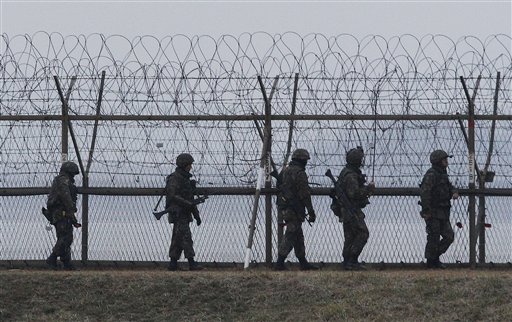SEOUL – North Korea’s military threatened the South with imminent “sledge-hammer” retaliation on Tuesday, unless Seoul apologized for anti-Pyongyang protestors burning effigies of its revered leaders.
The warning came a day after US Secretary of State John Kerry wrapped up a Northeast Asian tour aimed at defusing soaring military tensions on the Korean peninsula and getting China to help rein in a belligerent Pyongyang.
As North Korea celebrated the birthday of late founding leader Kim Il-Sung on Monday — a major national holiday — around 40 protesters in Seoul burned portraits of Kim, his son Kim Jong-Il and grandson and current leader Kim Jong-Un.
Condemning what it described as a “thrice-cursed… monstrous criminal act,” the Korean People’s Army (KPA) Supreme Command issued an “ultimatum” threatening immediate action if an apology was not forthcoming.
“Our retaliatory action will start without any notice,” it said in a statement carried by the Korean Central News Agency
“The military demonstration… will be powerful sledge-hammer blows at all hostile forces hurting the dignity of the supreme leadership,” it added.
Intelligence reports suggest the North has had two medium-range missiles primed to fire from its east coast for at least a week, with most observers predicting a launch around the date of Kim Il-Sung’s birthday.
During his whirlwind tour of South Korea, China and Japan, Kerry had warned that a test-launch in the current tense climate would be a “huge mistake.”
Amid the angry threats contained in Tuesday’s ultimatum, some analysts noted that the demand for an apology was couched in language that might open the door to the dialogue the South has been suggesting for days.
“If the puppet authorities truly want dialogue and negotiations, they should apologize,” the KPA statement said.
“The emphasis there is placed on conditions for resuming dialogue and that is worth noting, said Kim Yong-Hyun, a North Korea expert at Dongguk University in Seoul.
Until now, Pyongyang has dismissed dialogue overtures from South Korean President Park Geun-Hye and some of her ministers as a “crafty trick.”
The Korean peninsula has been in a state of heightened military tension since the North carried out its third nuclear test in February.
Incensed by fresh UN sanctions and joint South Korea-US military exercises, Pyongyang has spent weeks issuing blistering threats of missile strikes and nuclear war.
During his trip, Kerry raised the prospect of “authentic” negotiations with Pyongyang if it took “meaningful steps” to show it would honor past commitments.
He also gave US blessing to peace moves by South Korean President Park Geun-Hye, who has signalled to “listen to what North Korea thinks”.
In a further show of solidarity, it was announced Tuesday that US President Barack Obama would hold his first White House talks with Park on May 7.
The White House said the talks — a highly visible diplomatic statement by Washington and Seoul — would highlight continuing coordination between the allies in “countering the North Korean threat.”
The missiles mobilized by the North for a possible launch are reported to be untested Musudan models with an estimated range of up to 4,000 kilometres (2,485 miles).
That would cover any target in South Korea and Japan, and possibly even US military bases on the Pacific island of Guam.
South Korean and US forces have been on a heightened state of alert for days, and Japan has deployed Patriot anti-missile systems around Tokyo and promised to shoot down any missile deemed to be a threat.
South Korean Defence Ministry spokesman Kim Min-Seok said Monday the alert would remain in force as long as the threat of a missile launch remained credible.
“We believe the situation may drag on for quite a while,” Kim said.
